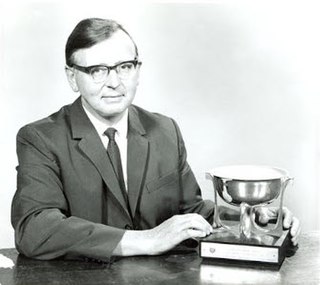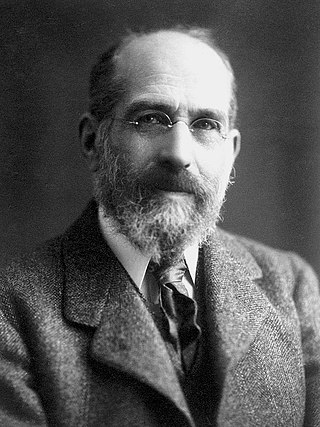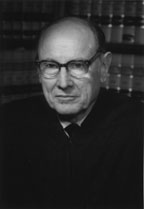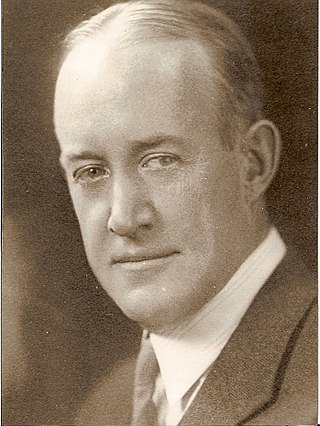Related Research Articles

John Dalton was an English chemist, physicist and meteorologist. He introduced the atomic theory into chemistry. He also researched colour blindness, which he had; as a result, colour blindness is known as Daltonism in several languages.

James Prescott Joule was an English physicist, mathematician and brewer, born in Salford, Lancashire. Joule studied the nature of heat, and discovered its relationship to mechanical work. This led to the law of conservation of energy, which in turn led to the development of the first law of thermodynamics. The SI derived unit of energy, the joule, is named after him.

Sir Adolphus William Ward was an English historian and man of letters.

Sir Nikolaus Bernhard Leon Pevsner was a German-British art historian and architectural historian best known for his monumental 46-volume series of county-by-county guides, The Buildings of England (1951–74).

James Hardy Wilkinson FRS was a prominent figure in the field of numerical analysis, a field at the boundary of applied mathematics and computer science particularly useful to physics and engineering.

Sir William Boyd Dawkins was a British geologist and archaeologist. He was a member of the Geological Survey of Great Britain, Curator of the Manchester Museum and Professor of Geology at Owens College, Manchester. He is noted for his research on fossils and the antiquity of man. He was involved in many projects including a tunnel under the Humber, a Channel Tunnel attempt and the proving of coal under Kent.

William Henry was an English chemist. He was the son of Thomas Henry and was born in Manchester England. He developed what is known today as Henry's Law.

James Richard Atkin, Baron Atkin,, commonly known as Dick Atkin, was an Australian-born British judge, who served as a lord of appeal in ordinary from 1928 until his death in 1944. He is especially remembered as the judge giving the leading judgement in the case of Donoghue v Stevenson in 1932, in which he established the modern law of negligence in the UK, and indirectly in most of the common law world.

John Gardner was a Scottish legal philosopher. He was senior research fellow at All Souls College, Oxford, and prior to that the Professor of Jurisprudence at the University of Oxford and a fellow of University College, Oxford.

Sir Franz Arthur Friedrich Schuster was a German-born British physicist known for his work in spectroscopy, electrochemistry, optics, X-radiography and the application of harmonic analysis to physics. Schuster's integral is named after him. He contributed to making the University of Manchester a centre for the study of physics.
Harry Wicks was a British socialist activist.

Robert Ernest Keeton was an American lawyer, jurist, and legal scholar. As a law professor at Harvard Law School and a United States district judge of the United States District Court for the District of Massachusetts he was known for his work on torts, insurance law, and practical courtroom tactics. Keeton, with Jeffrey O'Connell of the University of Virginia School of Law, played a key role in the advancement of no-fault automobile insurance.

Austin Tappan Wright was an American legal scholar and author, best remembered for his major work of Utopian fiction, Islandia. He was the son of classical scholar John Henry Wright and novelist Mary Tappan Wright, the brother of geographer John Kirtland Wright, and the grandfather of editor Tappan Wright King.

Harry Frederick Ward Jr. was an English-born American Methodist minister and political activist who identified himself with the movement for Christian socialism, best remembered as first national chairman of the American Civil Liberties Union (ACLU) from its creation in 1920 until his resignation in protest of the organization's decision to bar communists in 1940.
Harry Leonard Shorto was a British philologist and linguist who specialized on the Mon language and Mon-Khmer studies. He authored both a modern Mon dictionary and a dictionary of Mon epigraphy. He worked for most of his career at the School of Oriental and African Studies, University of London, finally as Professor of Mon-Khmer Studies at the University of London until his retirement in 1984.
Harry Longueville Jones (1806–1870) was a Welsh archæologist, artist, Inspector of Schools for Wales and leading founding member of the Cambrian Archaeological Association.
Harry Harris FRS, FCRP, was a British-born biochemist. His work showed that human genetic variation was not rare and disease-causing but instead was common and usually harmless. He was the first to demonstrate, with biochemical tests, that with the exception of identical twins we are all different at the genetic level. This work paved the way for many well-known genetic concepts and procedures such as DNA fingerprinting, the prenatal diagnosis of disorders using genetic markers, the extensive heterogeneity of inherited diseases, and the mapping of human genes to chromosomes

The Great Air Robbery is a six-reel silent 1919 American drama film directed by Jacques Jaccard and produced by Universal Pictures. The film stars Ormer Locklear, Allan Forrest and Ray Ripley. The Great Air Robbery is a film that showcases the talents of stunt pilot Locklear, considered the foremost "aviation stunt man in the world", and depicts pilots flying air mail, the first film to deal with the subject. There are no known archival holdings of the film, so it is presumably a lost film.
Robert Dunlop was a British historian who specialized in the history of Ireland.

Harry Britten was a British entomologist who worked at the Manchester Museum. He was involved in collecting and growing the collection of the Manchester Museum in numerous groups. A namesake son (1894-1976) also took an interest in entomology and specialized in flies of the family Tephritidae.
References
- ↑ Smith, J.C. (1986 published 1987) Harry Street, 1919–1984,Proceedings of the British Academy, Volume 72 pp 473-490
- ↑ "Harry Street Papers - Archives Hub".
- ↑ https://global.oup.com/ukhe/product/street-on-torts-9780198811169?cc=gb&lang=en& [ dead link ]